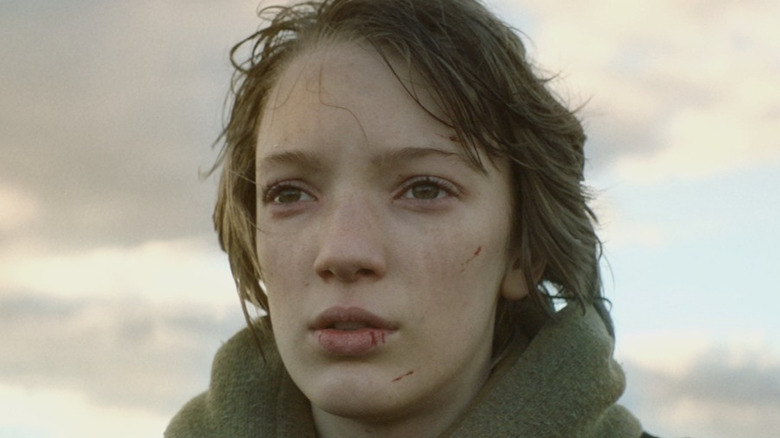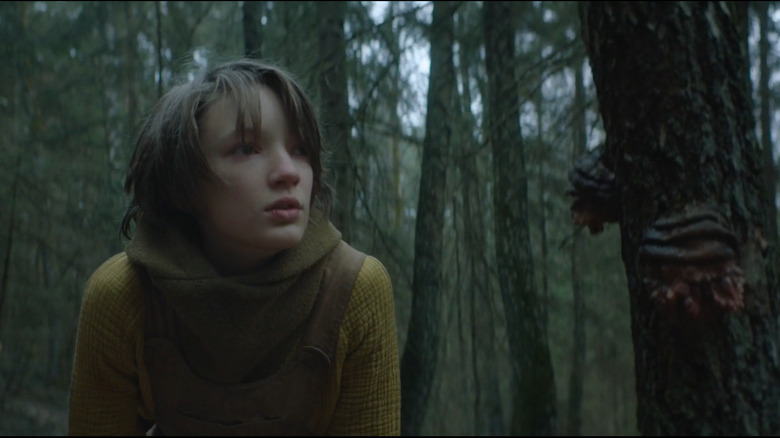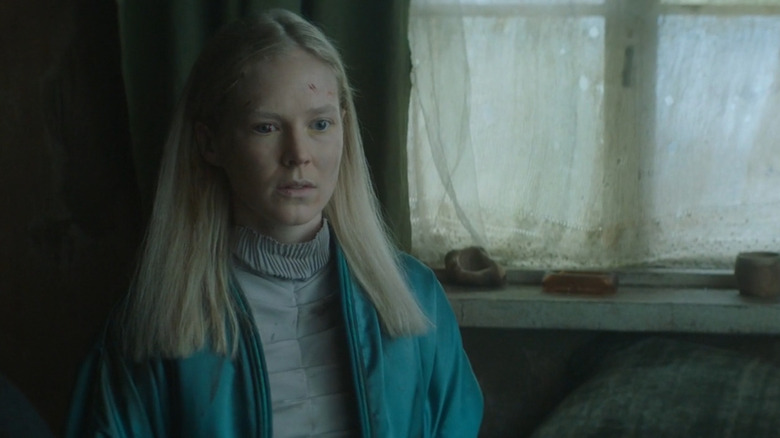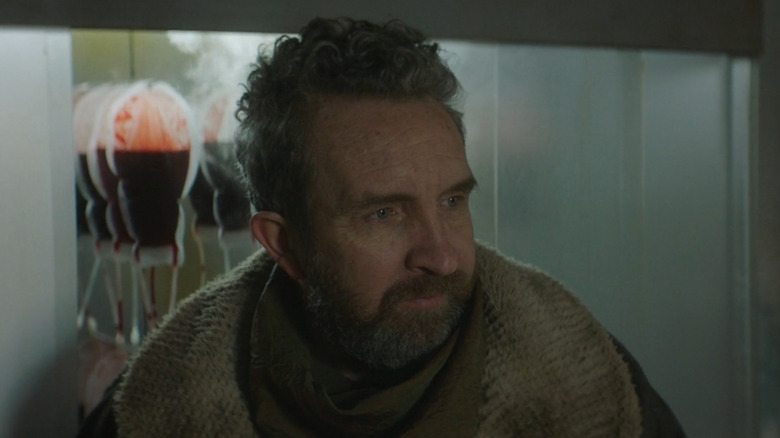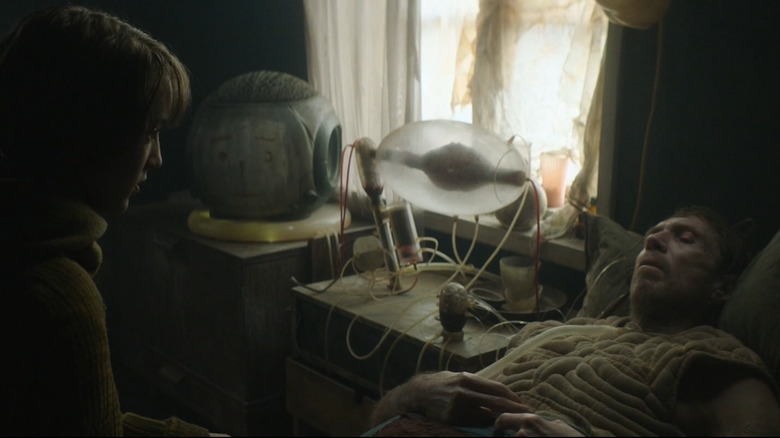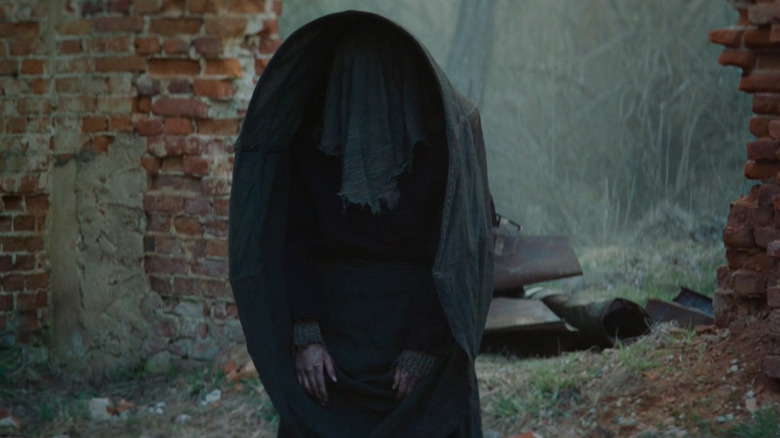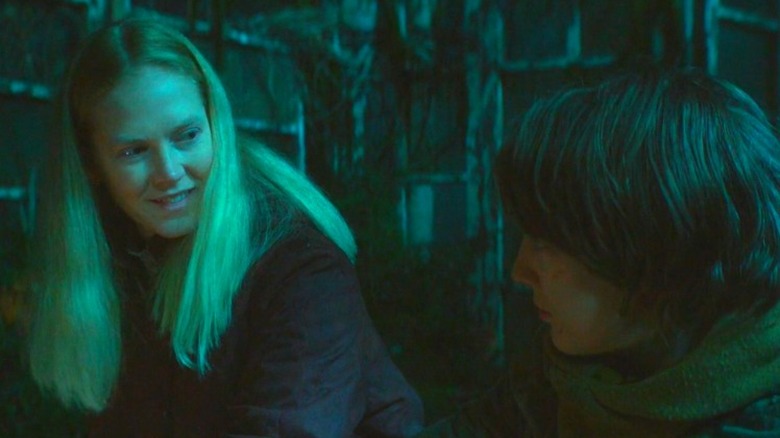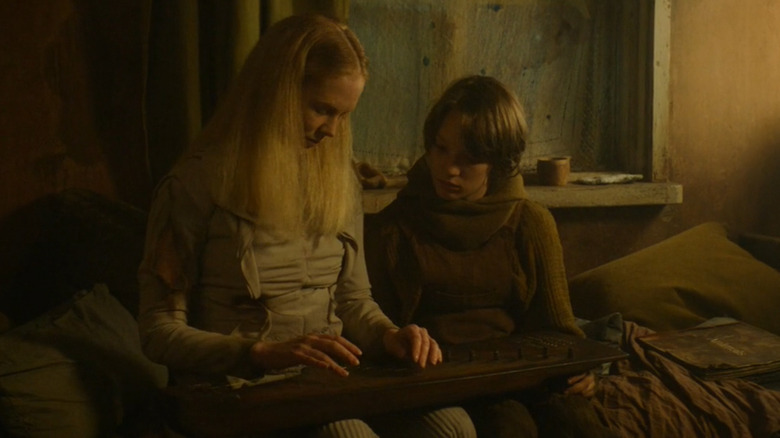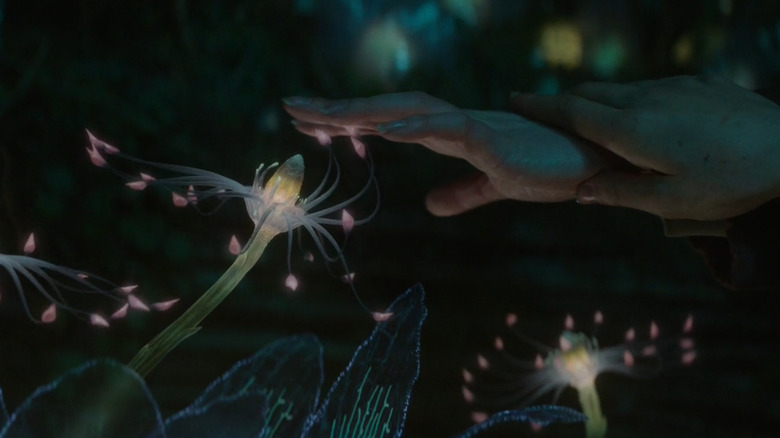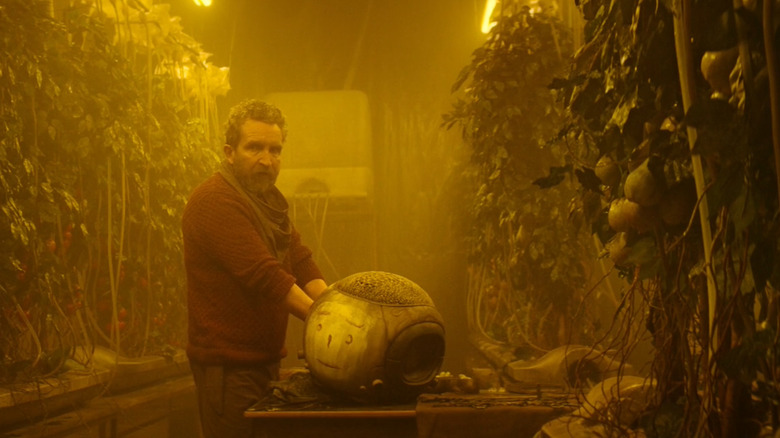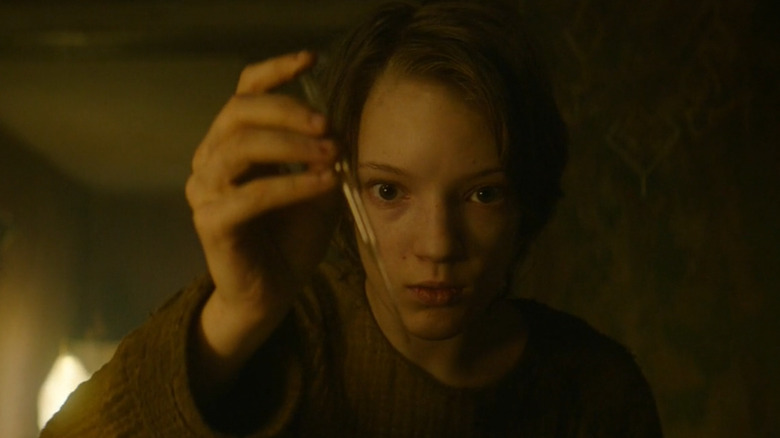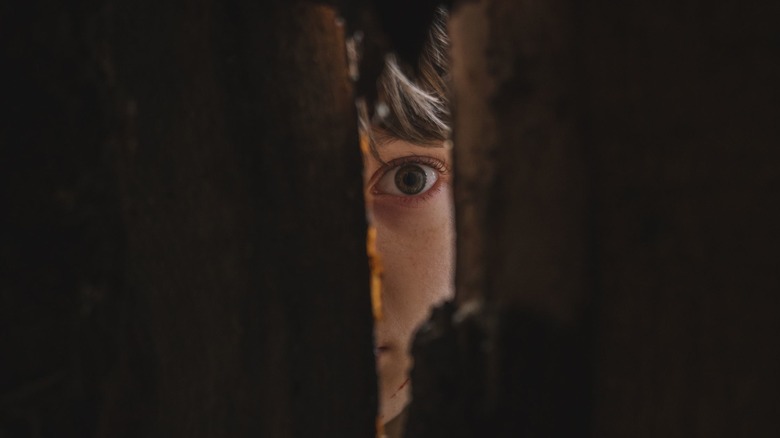The Ending Of Vesper Explained
A Lithuanian, French, and Belgian film, "Vesper" is an unsettling dystopian film that lingers for days beyond any viewing. While marketing for the film has been fairly quiet, "Vesper" has received positive reviews for its excellent cast, gorgeous world-building, and message of hope.
For those who have yet to watch the film, audiences in the United States can find it in select theaters, and streaming on HBOMax and other outlets.
The future Earth that "Vesper" paints for its audience is grim. The planet has suffered from ecological collapse, rendering itself unable to produce crops. Instead, trees now breathe, mycelium roots latch onto skin, and worms shoot out of the ground to nip at exposed areas. Vesper, a young girl with a talent for bio-engineering, lives with her bed-ridden father, communicating with him via a drone (who bears more than a passing resemblance to Wilson in "Castaway"). The pair dream of escaping to one of the citadels, which are technologically-advanced communities within giant bio-domes.
But when Vesper rescues a mysterious woman named Camellia, whose flier has crashed, everything changes. In the end, Vesper is alone, having lost everyone she cared about, but having found the secret to unlocking the citadel seeds, inspiring hope that Earth could once again become what it was.
Co-directors Kristina Buozyte (from Lithuania) and Bruno Samper (from France) began work on the film nearly six years ago, ultimately deciding to film in the grim, fairytale-esque forests of Lithuania. Rather than film in front of a green screen, Buozyte and Samper relied on the harsh woods as the background, adding surreal visual effects to heighten the post-apocalyptic feel of the production. While the film didn't make it to the box office top ten during its initial release in France, streaming numbers within the states will perhaps be more robust. Below is a (spoiler-heavy) breakdown of the film's final moments.
Getting past the citadels
Raffiella Chapman stars as the young Vesper (audiences might recognize her from "Miss Peregrine's Home for Peculiar Children"), a tenacious heroine determined to save her father, the citadel woman Camellia, and, by the end of the film, the planet. No small feat for a 13-year-old.
Vesper's goal once she meets Camellia is to help and use her as their entry into one of the citadels. After she learns that Camellia is not what she pretends to be and is, instead, an engineered lifeform known as a 'jug,' the citadels feel even more distant and perhaps, no perfect haven. The dreamlike cities represent heaven, where no one ever goes hungry, extinct animals still exist, and medical care allows residents to live incredibly long lives.
Ultimately, Vesper turns away from the citadels, quite literally, allowing this hope of a glorious, facile future life to fade. The final image of the film depicts Vesper climbing to the top of the pilgrim's tower, slowly facing away from the citadels, looking towards the river and grey forests surrounding her, and releasing the viable seeds into the wind. Vesper isn't waiting on the citadels to save her anymore, realizing that they aren't the answer to the world's troubles. She is.
The ending is ultimately hopeful, as Vesper realizes she can make the Earth better for everyone.
It feels something
Camellia, the woman Vesper rescues and who is eventually revealed to be a jug, is played by Rosy McEwen (the villainous Libby Hatch from "The Alienist" Season 2).
A "jug" is an engineered, human-like creature designed for labor in the world of "Vesper" — it is illegal to create an intelligent one. The setup for Camellia's character is excellent; early in the film comes one of the most disturbing scenes of the movie, as a jug is brutally executed after being injured. "It feels nothing," Jonas (Vesper's evil uncle) says. In her gentle nature and kindness towards Vesper, as well as her apparent emotional depth, Camellia seems to disprove this.
Camellia even becomes a mother figure for Vesper, comforting and teaching her about life in the citadel while supporting her as she searches for a way to spread the seeds. Ultimately, Camellia makes the ultimate sacrifice, sacrificing her own life so Vesper can continue.
Even though "Vesper" is an often dark, unsettling film, core characters Vesper and Camellia embody hope and love; it is through their ability to care for one another that humanity will survive. It's a clever plot device as well, because in many ways, Camellia is the key to the future. Not only does her DNA contain the keys to unlocking the seeds, allowing them to become viable, but she also trades herself for Vesper.
A path of villainy
There's more than one bad guy in "Vesper." The citadel soldiers provide a solid piece of faceless villainy, Earth itself is a hostile environment, and Vesper's uncle Jonas (portrayed by Eddie Marsan) is cruel enough to send shivers up the collective spine of any audience. Marsan, recognizable from solid work in projects like "Atomic Blonde" and "Ray Donovan," slips easily into this character, acting as the brutal leader of a small community, doing everything he can to ensure self-preservation.
Jonas, audiences understand, is a dangerous man. While he agrees to help Vesper, it's only after she offers up her veins, allowing Jonas to extract some of her blood to use as currency with the citadel. There's also the disturbing fact that he appears to be sexualizing his niece, lecherously stroking her face when he asks her to join their community, leading Vesper to inform him she won't be one of his "breeders." Ultimately, his relationship with the citadel makes him central to the plot, as Jonas reports to the citadel that he's found Camellia.
Jonas is a tool of the citadel, a collaborator — and in many ways, he stands as a clever reminder about the class metaphors inherent in "Vesper." Jonas both worships and loathes the citadels, playing their errand boy while despising how they use him. In the end, Jonas is killed by the citadel soldiers, executed alongside most of his small community, thereby releasing Vesper from the ties that would bind her to an old way of living.
Daddy (and the drone) knows best
Richard Brake has the distinction of playing one-and-a-half characters in "Vesper." Often the bad guy ("The Mandalorian," "Game of Thrones"), it's refreshing to see the Wales actor playing Vesper's stern but loving father. It's some complicated work.
The first version of her father is Darius, who was injured while fighting as a citadel soldier and is now unable to leave his bed. The second Darius is a drone, a smiling helmet linked to the man's body and accompanying Vesper as she roams the woods surrounding her house. The drone gives his daughter advice, keeps her company, scouts out dangerous areas, and scolds her occasionally for taking risks; nevertheless, he's unable to physically look after Vesper.
Viewers seem more likely to feel connected to the drone; he's a harsh but adoring father, doing all he can to care for his daughter from afar. "You don't know the cost of dreams," Darius tells her, understanding that sometimes sacrifice and loss are the only way to get what we want. In "Vesper," the dream in question is life in one of the citadels, even though Camellia warns Vesper that the citadel desires "control."
However, even Darius cannot imagine a future without the citadels, their seeds, and their control. In the end, Darius sacrifices himself to save Vesper, instructing Camellia to take her to one of the Southern citadels and bargain for their lives with the seeds. While he loved, protected, and gave his life for her, Vesper abandons the dream of the citadel, realizing that she must make a better future for them all.
Motherhood is a prominent theme in the film
In one of the film's first scenes, Vesper wonders about her mother and what might have made her leave. Her mother has become a pilgrim, it seems, one of the veiled women who roam the forest, scavenging for scraps of metal.
These pilgrims have giant blinders around their faces, almost like a massive umbrella, and it's believed that a virus compels them to leave their families and wander the Earth. Every time Vesper sees one of these pilgrims, she stares, determined to find her mother. "She's not coming back," her father says harshly.
Enter Camellia, the gentle jug and woman from one of the citadels. Camellia was created by her "father," Elias, a bio-engineer; Camellia, like Vesper, is motherless. For most of the film, Vesper is surrounded by men — her father, uncle, and male cousins — while all the women are faceless pilgrims. Camellia and Vesper bond, howling like wolves when Camellia teaches her animal noises, Vesper sharing an interest in botany and bio-hacking. Ultimately, Camellia's love for the girl saves Vesper, as she gives herself up to the citadel soldiers. After Vesper wakes to find Camellia gone, she follows the pilgrims — who might include her mother in their ranks — to their tower, using what these women have built to scatter the seeds and, hopefully, save Earth.
Artificial intelligence
"Vesper" covers a lot of ground for a movie less than two hours long. Some scenes are brutal, heartwrenching, and deeply unsettling, lingering long after the credits roll.
In particular, the murder of the jug (Melanie Gaydos) at the beginning of the film is a shocking moment. In the context of this world, the killing of this person isn't a big deal since jugs are considered unintelligent creatures with no more sentience than a robot or drone. Even Vesper, a kind and sensitive young woman, is unbothered.
Vesper is so thoroughly entrenched in her worldview that she can't see the disconnect between how treats her plants and the suffering of the jugs. To her, the jugs don't rate as high as the leaves and flowers in her greenhouse. Later, when she discovers that Camellia is a jug, Vesper pushes her, betrayed by the false promise Camellia made to take them to the citadel and angry she lied about her identity.
There is no explicit debate about the intelligence or emotional capacity of jugs at any point in the film. Instead, Vesper's change of heart towards Camellia, how she saves Camellia when she tries to harm herself, is shown through their actions towards each other. Even her father, Darius, comes to have respect for Camellia.
The central theme of hope
"Vesper," despite its darker elements, feels like a YA film, as the world is shown from Vesper's perspective. While the adults around her take a grim view of reality, Vesper maintains her youthful curiosity and genuine belief in the goodness of others; it is why she helps Camellia, against her father's advice.
By the film's end, Vesper has lost her father, her friend (and sometimes mother figure), and her uncle — but this doesn't stop her, even though she's utterly alone in the world.
According to filmmakers Buozyte and Samper, creating a film that could show beauty and love, even in the most desperate situations, was crucial. In an interview timed to the film's release, Buozyte said, "Our desire was to make a movie about hope. Even in the worst and most desperate situations, if we are able to see beauty, it won't be easy but we will always have a reason to live, to fight, and to change the order of things."
The film centers itself around the environment
Post-apocalyptic films are nothing new; typically, their events begin with a nuclear event or pandemic that causes the downfall of human society. However, in "Vesper, " civilization's collapse stems from the death of Earth's ecosystem, causing much of humanity to starve. While films like Kevin Costner's "Waterworld," Roland Emmerich's "The Day After Tomorrow" or George Miller's "Mad Max" films all depict environmental catalysts for their post-apocalyptic worlds, these films depict worlds decimated by change, not altered.
In "Vesper," the environment has become a Grimm fairytale. The woods are haunting, the lighting feels greyish and sickly. There are carnivorous mushrooms, flora that shoot poisonous darts, and even a few moody flowers.
With this unique angle, "Vesper" is able to make the environment feel both bizarre and familiar; the audience knows this Earth, and though it feels dangerous, its mutated plants craft a bold new world.
Speaking with Cineuropa in 2022, Samper talked about this inspiration. "The key word was "organic." We wanted [the audience] to feel the matter, to stimulate all five of their senses through the picture."
A low budget kept the world-building realistic
Unlike most modern science fiction films, "Vesper" had a relatively low budget of about $5 million. This necessitated the project keeping its special effects to a minimum, using the natural look of the woods and adding in unique biological elements later rather than relying on augmentation via green screen.
The decision to film in Lithuania was both a business decision and a stylistic one, due to the beautiful forests available around the city of Vilnius. Storyboarding of almost every shot, done by director of photography Feliksas Abrukauskas, kept the project on budget, as did utilizing French and Belgian visual effects studios. Since filming in Lithuania offers a substantial tax incentive for filmmakers, Buozyte and Samper were able to optimize their production value.
There might be a sequel in the works
"Vesper" was a film a long time coming; Buozyte and Samper had worked together previously on 2012's "Vanishing Waves" (also a science fiction film), and "Vesper" has been in the works pretty much ever since.
Initially, the two filmmakers intended for "Vesper" to be a standalone project, one that enabled them to make an English-language film in a foreign country. However, once he saw the film in its entirety, director Samper began feeling a bit differently. He now hopes to produce a sequel, depending on the film's success. "I was surprised myself when we saw the final edit on the big screen and to realize that I wanted to know what will happen after," he told Variety. "So yes, we are thinking already about a sequel."
Considering that the film leaves the audience with several unanswered questions about the pilgrims, where Vesper's mother might be, and what happens with those seeds once they take root, "Vesper" presents a world primed for further exploration. Perhaps a second "Vesper" could even give viewers a peek inside those mysterious citadels.
Vesper has a clear message from its filmmakers
"Vesper" can be a disturbing, unsettling film, and it doesn't shy away from making viewers uncomfortable. Yet, no matter how dark the movie may feel, its message is essentially a hopeful one that believes humanity is capable of change.
"The young protagonist is still growing and has an open mind, doesn't take already the given rules, and didn't adapt to the world," explains Buozyte. "So who is growing, who is searching, and who is searching for the way how to live, how to go on to, how to fight, just how to be in this world."
"We wanted to create a world never seen on the big screen and the biopunk fairy-tale genre gave us this possibility," adds Samper. "We worked on this universe for several years. We did a lot of research about the most recent innovations in organic architecture, bio-design, genetic engineering, and even the sexuality of plants."
The world has changed considerably in only the past ten years, since the filmmaking duo released "Vanishing Waves," most notably via the COVID-19 pandemic and the rise of climate-change-related natural disasters. Such changes inspired Buozyte and Samper to create a determined, pragmatic protagonist in Vesper. In an interview with Screen Daily, Samper explains their thinking. "Don't search for a utopic promised land elsewhere," he says, "but instead use your roots and your ambition to change the reality of where you are."
